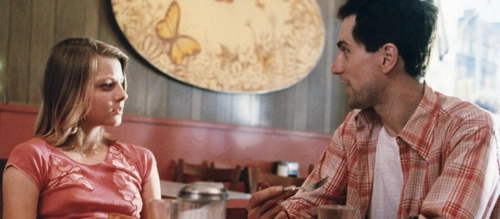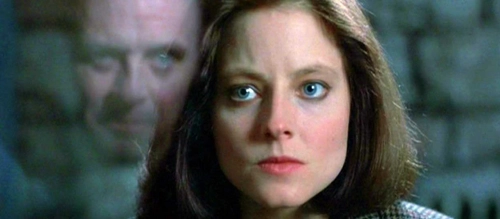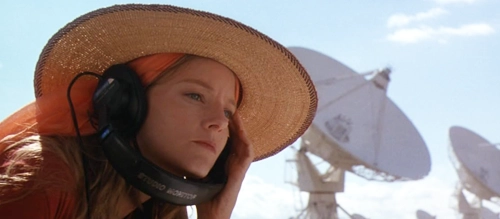Jodie Foster: 3 Career-Defining Performances
Alicia Christian “Jodie” Foster has been in front of a camera since she was 3 years-old, appearing in commercials and Disney original movies throughout her early childhood. An industry baby of undisputed prodigiousness, by adolescence she was starring in big-ticket television shows such as ‘Paper Moon’ (1974) and going toe-to-toe with Robert De Niro in Taxi Driver (1976). The former, an adaptation of the 1973 Peter Bogdanovich film of the same name, stars Foster as Addie Loggins, a con-man’s 9-year-old accomplice—the role which won Tatum O’Neal the Best Supporting Actress Oscar in 1974, making her the youngest-ever Academy Award winner. By 1977, at the age of 13, Foster was vying for the gold in the same category for her break-out role as Iris in Martin Scorsese’s Palme D’Or-winning film. She seemed to be wise beyond her years, capable of performances up to and exceeding her adult colleagues—and, as she continued to fill bigger and bigger shoes, Jodie Foster’s ascent to stardom seemed all but fated.
And yet it was not without its burdens. The considerable side-effects of growing up in the spotlight reached a disturbing crescendo by the time Foster started undergrad at Yale in 1980, where she was obsessively stalked by John Hinckley Jr., the Travis Bickle wannabe who would go on to shoot Ronald Reagan. Amazingly, Foster continued to act in films between semesters until she graduated in 1985—although few of them managed to garner critical or commercial success. That trend continued in the years following as Foster struggled to redefine herself as an actress. She had displayed such strength and graceful resilience on-screen and in her life: it was about time her adult roles reflected that.
That much-needed spark came with 1988’s The Accused, in which Foster plays a rape survivor fighting to bring her assailants to justice, and 1991’s The Silence of the Lambs, which saw her embody the now-iconic FBI trainee Clarice Starling alongside Anthony Hopkins’ legendary Hannibal Lecter. Foster won an Academy Award for each film, and she carried on the momentum through the 90s with celebrated performances in films such as Nell (1994) and Contact (1997), and even made her directorial debut with Little Man Tate (1991). Foster’s pedigree amongst her peers and audiences was undoubtedly cemented by the time she was invited to head the jury at the 2001 Cannes Film Festival, a position from which she ultimately stepped down to star in David Fincher’s suspenseful cat-and-mouse thriller Panic Room (2002).
Through the 2000s, Foster’s turn as the villainous Madeleine White in Spike Lee’s Inside Man (2006) and her well-documented but ultimately ill-fated effort to direct and star in a biopic about the notorious, if technically brilliant, Nazi propagandist Leni Riefenstahl made convincing counterpoints to dissenting criticisms accusing Foster of “sanctifying herself as an old-fashioned heroine [rather than] taking on dramatically risky roles.” Such criticisms arguably neglected to acknowledge the fact that Foster has been taking risks since she was a child, but they also failed to appreciate the deeply affecting vulnerability Foster brings to even the most competent and resolute of characters.
And, while Foster has been famously—and understandably—reticent about her personal life aside from her devastating 1982 Esquire essay “Why Me?,” which recounted her experience as a public figure up to the John Hinckley incident, and her 2011 Golden Globes speech which vaguely alluded to speculation surrounding her sexuality, this vulnerability has come to define her career. Jodie Foster is not only simply good at her job, much like many of the women she has played, but she also clearly brings a piece of herself to every role. Now, after a long stint working primarily as a director, she seems to be turning a new chapter—one that sees the celebrated actress return to form with projects such as the upcoming ‘True Detective: Night Country’ (2024), and get personal in films like 2023’s Nyad.
In 2021, Foster told the New York Times: “I am a solitary, internal person in an extroverted, external job. I don’t think I will ever not feel lonely. It’s a theme in my life. It’s not such a bad thing. I don’t need to be known by everyone.” Perhaps the reluctant movie star would rather her work speak for itself, as it does in these 3 Career-Defining Performances.
1. Taxi Driver (1976)

Any evaluation of Jodie Foster’s career would be incomplete without mention of her revelatory turn as Iris Steensma in Martin Scorsese’s early-career masterpiece. Hers is widely considered to be one of the best child performances of all time and earned her the first Oscar nomination of her career at the age of 13. Already an acclaimed child star for her work in films such as Disney’s Napoleon and Samantha (1972) and the 1973 adaptation Tom Sawyer, Foster seemed destined to become a defining performer of her generation. If Taxi Driver taught us anything, it’s that she already was.
Martin Scorsese must have sensed it, too. Foster had previously appeared in the auteur’s 1974 film Alice Doesn’t Live Here Anymore, so by the time she was cast in Taxi Driver, she and Scorsese had already established a working relationship. Still, then-12-year-old Foster’s casting as a child prostitute opposite Robert De Niro’s antisocial weirdo Travis Bickle raised more than a few eyebrows. Abundant cautionary measures were taken to ensure Foster’s—and her mother’s—comfort while performing, including regular psychiatric check-ups, constant accompaniment by a social worker on set, and the substitution of Foster with her older sister Connie for a few particularly suggestive scenes.
Foster herself, though, seemed unfazed by her role’s apparent ethical grayness: “To me it was another role, and I understood the difference between making movies and actually being a person. So it wasn’t really impactful for me. I don’t think I was confused by the sexuality in the film,” she recalled. It might be an overstatement to assume that Foster had a complete and clear-eyed understanding of the film’s thematic material at the time, but she embodied this character with such fearlessness and emotional candor that she elucidates it all the same.
Her character does not get significant screen time until the film’s third act, when the increasingly unstable Bickle takes it upon himself to facilitate her liberation—and yet Iris is not merely the object of Bickle’s crusade but also the film’s beating heart. Upon their first meeting, or in the iconic diner scene, the sociopathic Bickle is baffled by Iris’s naive buoyancy. She’s a victim of a perverse society, undoubtedly more so than Bickle, and yet her sense of indignation seems far less than that which he feels on her—and his—behalf. By the time Bickle goes on his rampage, the textually rich interactions between he and Iris have called into question any notion that his actions are driven by anything other than a need to placate his violent urges in the name of righteous justice. Still, Iris represents the sort of injured humanity that no doubt wrestles for control inside Bickle. The kids aren’t alright, and neither is he. This layered diagnosis of the many diseases plaguing American society after the Vietnam war (and which are just as prescient today) would have been simply incomplete without Foster’s acutely intelligent and affecting performance.
While Foster would go on to bolster her early-career resume with starring roles in tentpole films like Freaky Friday (1976) and Bugsy Malone (1976), it was undoubtedly Taxi Driver that would come to define this stage of her career; not only for its revered status, but also for what was undoubtedly her coronation as a performer well ahead of her time—and meant for much more than Disney originals. Robert De Niro famously took Foster under his wing while filming, which, it could be reasonably assumed, only refined her enormous talent. “He really helped me understand improvisation and building a character in a way that was almost nonverbal,” Foster said of the experience. With one of the most prolific actor-filmmaker tandems of all time attesting to her skills, Jodie Foster was clearly bound to play with the big kids.
2. The Silence of the Lambs (1991)

The Silence of the Lambs Review
Foster won her second Oscar for her role as Clarice Starling, the industrious young FBI investigator opposite Anthony Hopkins’ cerebral and chillingly polite Hannibal Lecter, an incarcerated cannibal Starling is tasked with gleaning psychological insight from to help catch a serial killer. Fresh off her first win for her role in 1998’s The Accused, Foster was in a new prime—and while her performance in that film could just as well represent this stage of her career, it is her turn as Starling that has since been immortalized.
Despite her newfound acclaim in adult roles, Foster had to wait behind industry fixtures such as Michelle Pfeiffer, Meg Ryan, and Laura Dern for the role—all three declined the part due to film’s disturbing themes and Foster, having expressed enthusiasm for the part since she read the 1988 novel, got her shot.
The film has since reached classic-status—despite controversy surrounding its polarizing treatment of themes related to transgenderism and sexuality—thanks in no small part to Foster’s performance. Foster’s Starling, small in stature, nonetheless consumes every scene she’s in, transcending even Sir Anthony Hopkins, who is also at the top of his game. Director Jonathan Demme frequently frames Clarice in close-ups, which feels like a deliberate rendering of the inescapable male gaze that follows her everywhere, and Foster, with her aptitude for the subdued and unspoken, shines. She convincingly embodies a woman who is simultaneously unwavering and deeply vulnerable in the face of Lecter’s psychological ambushes. It’s the type of thing that separates run-of-the-mill crime thrillers from timeless innovations of the genre—and Foster’s performance is timeless in its own right.
Would it be going too far to say her role in Silence was one of Foster’s most personal? Perhaps not, since Foster reportedly tried to option the novel even before Demme was attached, and since the film offers compelling reflections on gender politics and the experience of being watched. Foster was, unfortunately, no stranger to such themes in her real life, so it makes sense that she approached the role with profound honesty and vulnerability. Clarice is tough; she’s “the woman that saves the women.” And yet she exists in a discomfiting reality that most women know all too well.
The tension between these elements illuminates a theme that would come to define the roles Foster took on. If not lambs, then Foster’s unusual life experiences nonetheless scream through her work. From “Why Me?”: “There were things to be done, secrets to keep. I was supposed to be ‘tough,’ like cowboys, like diplomats, like ‘unaffected actresses’—not because anyone asked me to but because I wanted to show them (God knows who) that I was strong. I wanted to show them all that Jodie was so uniquely ‘normal’ and ‘well-adjusted’ that nothing could make her fall. I think I believed all this, my subconscious propaganda.”
3. Contact (1997)

By 1997, Jodie Foster was a bonafide movie star. Suddenly, she found herself being sought after for bigger and bigger projects—which would result in a string of genre star vehicles around the turn of the millennium. The actress would go on to work with the likes of David Fincher and Spike Lee, but it was perhaps her collaboration with Robert Zemeckis in his sci-fi melodrama Contact (1997) that bore the most memorable performance from this period in her career.
The film, an adaptation of Carl Sagan’s 1988 novel, was a box office success and has largely held up over time despite mixed reviews upon its release. Foster’s performance is far and away the best part of the film, as her character Dr. Ellie Arroway becomes more than a generic sci-fi protagonist in her quest to establish contact with extraterrestrial beings. Foster, with her trademark rugged sensitivity, largely embodies the tension between faith and science and the messy convergence of the two. Like the film’s screenplay, Foster’s performance is interesting because it cleverly subverts easy clichés in favor of a more grounded, humanistic exploration of its otherwise schmaltzy premise. She’s no Ellen Ripley, but she’s just as heroic.
A film of cosmic ambition, Contact works precisely because of Foster’s ability to bring depth and sincerity to her character. As Dr. Arroway gets swept up in the frenzied worldwide response to her discovery of an otherworldly radio transmission—a flagrant confirmation of the existence of extraterrestrial life—her character nonetheless feels honest and believable, which makes her ultimate journey into space all the more compelling. Zemeckis understands this and rarely separates the audience from Foster even as the film’s scale expands dramatically.
In Foster’s own words: “I think, more than any character that I’ve ever played, Ellie Arroway is the most like me or at least the most like how I think I should be seen — how I see myself or something.” The lonely astronomer might not be the first of Foster’s characters to feel like a de facto analogue for Foster herself, but her sci-fi milieu only confirms that Foster has the chops to tackle any kind of material.
Whether she’s surrounded by blue screens or rubbing elbows with other iconic performers, Jodie Foster consistently delivers performances capable of moving even the most cynical viewer. Her filmography boasts a pantheon of strong-willed heroines, precocious youngsters, and complicated women—and her prolific directorial career is nothing to thumb your nose at. With more to come from the legendary actress as she enters her 60s, now is as good a time as ever to appreciate her storied career.
Written by Connell Oberman
You can support Connell Oberman in the following places:
Twitter: @ObermanConnell
Instagram: @connello_22
Substack: ConnellOberman

